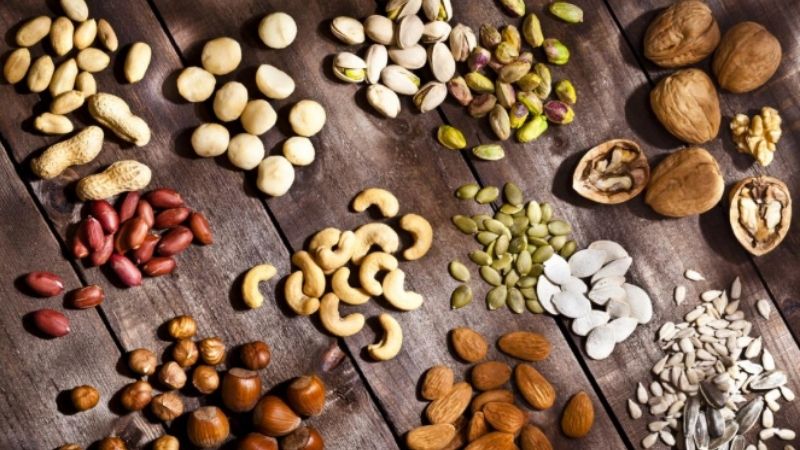Cardiovascular disease is a silent killer, claiming millions of lives each year. To protect yourself, it’s essential to adopt healthy eating habits and lifestyles. Let’s explore some tips together.
1 3 Additional Principles for Mealtime
Include Vegetables and Fruits with Meals
 Include Vegetables and Fruits with Meals
Include Vegetables and Fruits with Meals
According to Sam Kass, he always includes vegetables and fruits in his daily meals. These food groups are rich in fiber and provide essential vitamins and minerals, especially antioxidants, which help prevent cardiovascular disease and reduce wrinkles.
Therefore, it’s advisable to prioritize purchasing and serving these food items to your family. It’s best to prepare them immediately after buying to maintain their freshness and nutritional value. Additionally, it’s recommended to consume fruits about an hour after a meal for optimal nutrient absorption.
Incorporate Nuts and Seeds into Your Diet
 Incorporate Nuts and Seeds into Your Meals
Incorporate Nuts and Seeds into Your Meals
Research from the Harvard T.H. Chan School of Public Health (US) suggests that one of the simplest ways to prevent cardiovascular disease is to eat nuts and seeds. Consuming 28 grams of nuts per day can reduce the risk of cardiovascular disease by 6% and the risk of coronary heart disease by 13%.
The study also highlights that nuts such as almonds, walnuts, pistachios, peanuts, and hazelnuts are particularly effective in lowering the risk of cardiovascular disease.
Nuts and seeds are packed with nutrients and healthy fats, which help prevent blood clots, a leading cause of heart attacks and death. Additionally, they aid in lowering bad cholesterol levels.
Sam Kass also incorporates nuts and seeds into his daily meals to boost his health. He considers them a healthy snack option that won’t contribute to obesity concerns.
Stay Hydrated
 Stay Hydrated
Stay Hydrated
Mr. Sam shared, “Drinking enough water daily supports kidney function in flushing toxins from the blood, thereby reducing negative impacts on the heart and preventing cardiovascular disease. Water also hydrates the skin from within, promoting a supple and youthful appearance. Personally, I ensure I drink at least 2 liters of water every day.”
Water is essential for all life forms. It constitutes 70-80% of our body weight, and abstaining from water for just a week can be fatal.
Water provides our bodies with essential fluids, transports nutrients and oxygen to cells, and nourishes them for various bodily functions.
In addition to drinking water, women can stay hydrated by eating watery fruits like watermelon, oranges, and grapefruit. It’s advisable to limit sugary drinks as they contribute to cardiovascular disease and obesity.
2 Water Consumption Tips for Heart Health
 Water Consumption Tips for Heart Health
Water Consumption Tips for Heart Health
Keep in mind the following three tips to maintain optimal cardiovascular health:
-
Upon Waking Up: Blood pressure tends to rise during sleep, increasing the risk of blood clots. Drinking water first thing in the morning helps thin the blood, improve circulation, and protect cardiovascular health.
-
30 Minutes Before Bedtime: Drinking water at this time helps thin the blood and prevent blood clots as blood flow tends to slow down during sleep.
-
During Midnight Awakenings: If you wake up in the middle of the night, drinking a glass of water can significantly reduce the risk of heart and brain vascular diseases. Heart attacks and vascular ruptures are more likely to occur around 2 a.m., especially in the summer when dehydration is more prevalent, or when experiencing vomiting or diarrhea.
3 Additional Tips for a Healthy Heart
In addition to the “3 Additional Principles” for mealtime, the following suggestions will contribute to a healthier heart:
 Tips for a Healthy Heart
Tips for a Healthy Heart
-
Exercise: Regular exercise is beneficial for overall health. Aim for at least 30 minutes of simple daily exercises to maintain a healthy body.
-
Healthy Eating: Adopt a diet rich in whole grains, vegetables, and fruits, while limiting processed foods, sugary drinks, and alcohol.
-
Adequate Sleep: Strive for 7 hours of sleep per night. If you experience insomnia or difficulty sleeping, consider seeking professional help to improve your sleep quality.
-
Manage Stress: Positive thinking benefits both mental and cardiovascular health. If you feel stressed, try light exercises or socializing with friends to effectively relieve stress.
 Quit Smoking and Limit Alcohol Consumption for a Healthy Heart
Quit Smoking and Limit Alcohol Consumption for a Healthy Heart
-
Quit Smoking: Smoking is a leading cause of coronary artery disease. Make a conscious effort to quit smoking and avoid secondhand smoke.
-
Limit Alcohol Intake: Alcoholic beverages like beer and liquor not only induce intoxication but also contain high calories, leading to weight gain and overworking the heart. Aim to limit alcohol consumption to less than 150ml per week and eventually quit altogether.
This article has provided insights into the “3 Additional Principles” for mealtime and offered valuable tips for maintaining a healthy heart. We hope that by adopting these suggestions, you can effectively protect your cardiovascular health and overall well-being. Thank you for reading.
Unlock 8 Benefits with a Daily 5-Minute Jog
Living a hectic lifestyle can make fitting in time to exercise difficult. However, studies have revealed that even just 5 minutes of jogging a day can lead to positive outcomes for your health, including a decrease in the risk of developing cardiovascular disease, extending your life span by up to 3 years, or even reducing the susceptibility to heart disease.














